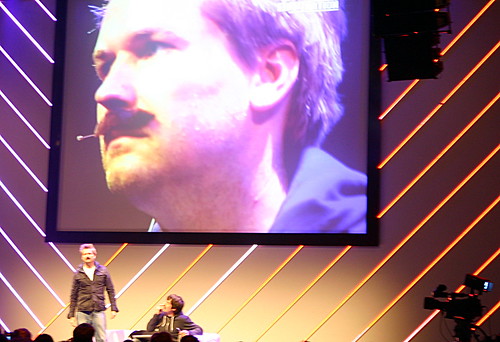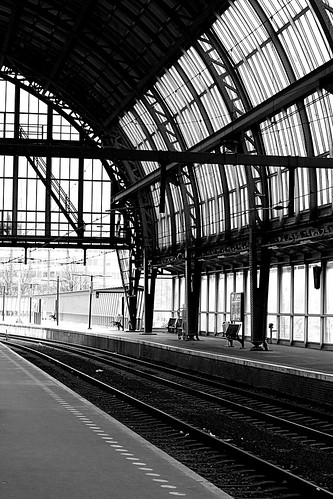Before the official closing of The Next Web Conference 2008, we were shown the premier of the new documentary “The Truth According To Wikipedia”. IMDB page suggests that the film is post-production and the director, who was present at the conference and had a few words to say before the premier, noted that he finished editing of the movie just that morning.
Boris, one of the conference organizers, had this to say in one of his recent blog posts:
The video led to heated debate between the maker of the documentary and some of the audience members and even during the party afterwards people where still discussing the video. […] The questions it raises are far from answered […]
Note that as organizer Boris has to be nice to people, so that they won’t be too afraid of showing up next year.
I, on the other hand, can say whatever I want and feel like. And here is how I feel about the movie – it sucked. Not to offend organizers for showing it, but they probably haven’t seen it themselves before it was premiered.
Purely from the movie purpose of view – it was boring. It hadn’t much pace or depth and it wasn’t packed with information either, so I was struggling not to fall asleep most of the time. From the documentary point of view it was very weak. The interviews in the movie were vaguely connected, presenting only two view points on the situation. And there weren’t enough numbers and references to support either side. And the whole argument looked like a semi-heated discussion on something somewhat important between a couple of somehow famous guys. Anybody who ever participated in any forum or have been subscribed to any mailing list for longer than three month is familiar with the type of the discussion. Not trolling yet, but pretty close.
Now, to the point of the argument. Wikipedia is an encyclopedia where everyone and anyone can add, edit, or delete content. There is no way to establish credentials of any contributor and there is no way to identify experts. Nobody is responsible for the accuracy of the information. And so on and so forth.
As I said before, there are two sides of the argument in the film. One side suggests that people are good by nature and given some guidelines will improve things constantly. The other side suggests that in order to contribute something, someone should be “an established expert in the field” (whatever that means), and by such the information contributed will be more accurate and trustworthy.
Can you guess which side I am on? You probably can. I am all for wisdom of the crowds. I do believe that wisdom of the crowds is very much like meat – it’s nice and all, but it needs some cooking to taste its best. So, just opening Wikipedia for everyone and everything will degrade its quality. Gladly, as open as Wikipedia is, there is a certain level of control to rule abusers out. I think Wikipedia has just enough.
How do we know if information in Wikipedia is accurate and trustworthy? We don’t. Human history has been through enough discovery iterations to prove that things people believe in change. As do things proven by our own science. As one of our professors in the college used to say: “There are no absolutes. Only vodka.”
Ask any expert out there if they were ever proven wrong. If they say they weren’t, either they lied or they aren’t experts. Now, if you still want to go deeper into this then think about how do you distinguish an expert from a non-expert. Degrees? Certificates? Years of experience in the field? Recommendations of other experts? A combination of these? How well does your criteria apply to different areas of human life? Can you still find experts in such subjects as Philately and Dog training? If so, how many languages do those experts speak? After all, you will need to verify the translations too, won’t you?
Do you want to continue? If so, try to remember a few experts that you talked to. On any subject. One thing that I often come across is that experts are some of the most difficult people to understand. They usually know their subject inside out and can freely manipulate it back and forth and side to side. They also often use plenty of terminology. So if I’d ask an expert to explain me the subject matter, I’d often be better of with a non-expert book which will know how to assume that readers don’t know much just yet. Nice touch to Wikipedia is that experts can actually share the knowledge while less knowledgeable people can edit it into a plainer text, available to the rest of the world’s understanding.
So, yes, I believe that knowledge bases should be as open as possible. Anyone (or almost anyone – minus the abusers) should have full access. People should contribute to knowledge bases as much as they can – be that original, high level knowledge, or editing of the form, or fixing typing mistakes, or providing references and supplementary materials, or anything else. There is no way to know for sure if any article or page or fact is trustworthy. But anyone can establish that for themselves. If you don’t trust a piece of information – don’t use it. If you doubt something – check, double check, and cross check. If you notice an error or just know better – contribute your knowledge. This way we’ll have the most updated, most accurate, most cross-references, and most easily explained knowledge gathered and organized.
Oh, and if you are to make a movie about a popular phenomena, at least do your home work. Study as many different views as possible. Bring in as many people as possible. And look at history, numbers, and trends. That should put you on a right track.
Update: There is also a discussion about the movie over at TechCrunch.


